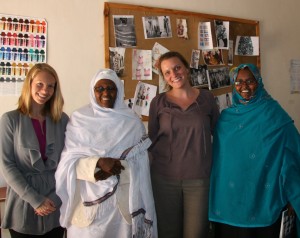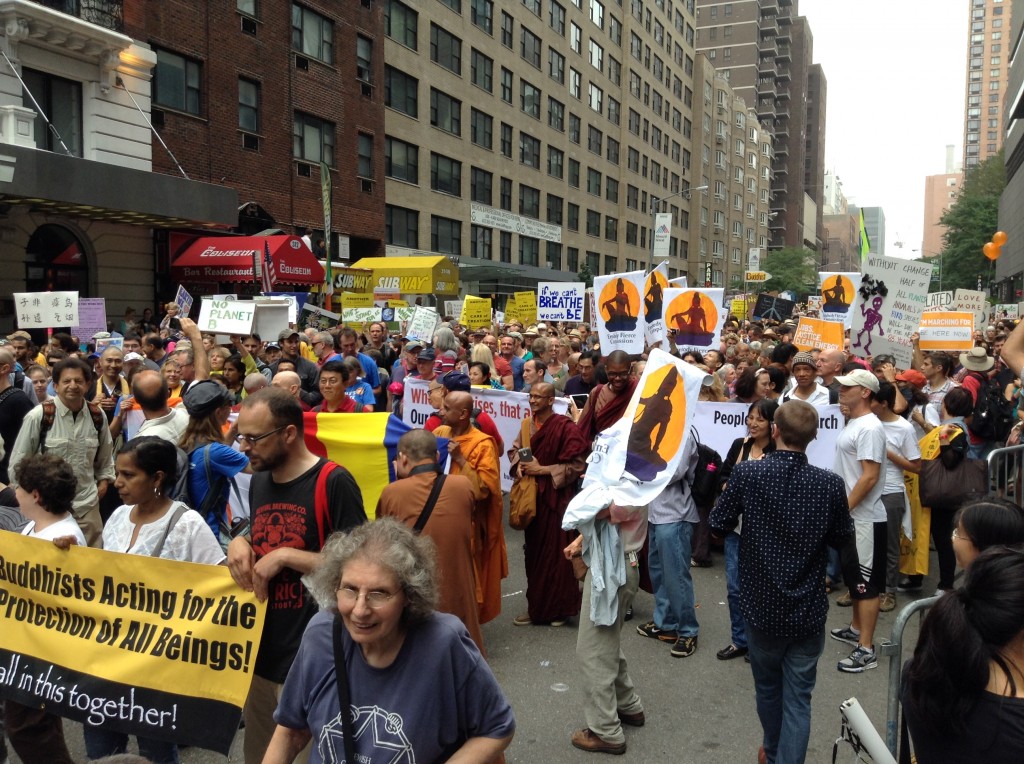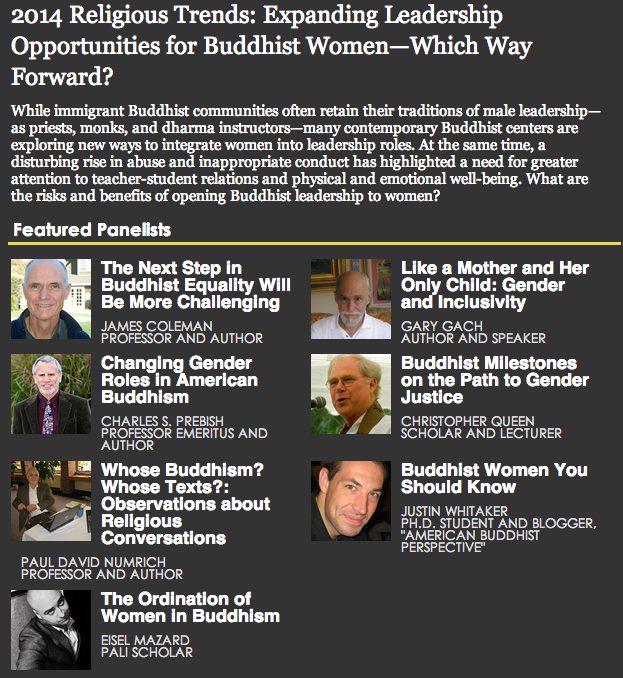
Over at my personal website, I’ve posted a few times about my friend and former Naropa University classmate Alisa Roadcup. Formerly Outreach Director and Development Associate for the Council for a Parliament of the World’s Religions and Director of Strategic Initiatives for The Voices and Faces Project, she is currently Vice President of the Board of Directors for Rape Victim Advocates and a leader in the Women’s Human Rights Coordination Group for Amnesty International USA. She is also busy these days as the Director of U.S. Advocacy and Development for Heshima Kenya, an international nonprofit organization operating in Nairobi, Kenya, to protect “unaccompanied refugee children and youth, with a special focus in supporting women and girls ages 13 to 23 years old from Somalia, Ethiopia, DR Congo, Sudan, Rwanda, and Burundi.”
Alisa is not only a great friend, but one of my personal heroes as well: in the “Spiritual Leadership” course that I taught at University of the West last year, I shared with students on the first day about people who have been important in terms of my own personal spiritual growth and development. Alisa was one of the people that I talked about. In the past, I’ve interviewed her for Shambhala Sun Space, and I’ve shared some pretty cool pictures of the two of us meeting some amazing figures, including Karen Armstrong and Diana Eck (click on the names to see the photos).
She was extremely gracious to make time recently to answer some questions for us about the work that she’s doing now. Take a look below, and get hip to an organization that should definitely be on your radar!
*
Alisa, would you introduce readers who are not familiar with the organization to Heshima Kenya.
Thank you for this opportunity, Danny! Heshima Kenya is the first organization in Kenya devoted to protecting and empowering urban unaccompanied refugee girls and young women living in Nairobi, with a special focus on girls ages 13 to 23 years old from Somalia, Sudan, Ethiopia, Eritrea, Rwanda and the Democratic Republic of Congo. We provide comprehensive services through our Safe Shelter (recognized recently by the UNHCR as Kenya’s top raked safe shelter for children), educational and economic empowerment programs, legal advocacy and case management services. By providing resources and support for healing and leadership development, Heshima girls become catalysts for change within their own communities once they are ready to step back into the world on their own.
Heshima Kenya states that unaccompanied refugee children and youth are “the most vulnerable and invisible population in the world.” As I understand it, Nairobi has quite a large population of orphaned and separated refugee children and youth. Would you say something about this population generally-speaking, and why a special focus on Nairobi is important?
Currently, over 100,000 refugees are living in the city of Nairobi, Kenya and over 10,000 are unaccompanied children and youth. Classified by human rights organizations as “unaccompanied,” all are alone, orphaned or separated from a primary family member and most have fled from persecution in nearby countries. These refugee children are often survivors of unimaginable atrocities; they have fled persecution or have been torn from their families, who have been killed or have disappeared in war. With very limited access to resources in Nairobi, such as shelter, education, and medical care, they cope with extreme poverty and the physical and emotional scars from war and, in many cases, prior abuse and exploitation. We know that refugee girls without family in Nairobi experience high rates of sexual violence, rape, and exploitation and Heshima Kenya is there to meet the needs of the most vulnerable, invisible population – refugee girls who are alone and without protection.
Heshima Kenya’s work is focused on “protection and empowerment.” Would you explain to us what this looks like on the ground?
Heshima Kenya is the only organization providing a continuum of holistic services for unaccompanied refugee girls in Kenya. Since 2008, we’ve provided services and support to over 350 girls and their children. We partner with organizations like Médecins Sans Frontières, the UNHCR and The Red Cross who refer individual cases on to us.
Each girl referred to Heshima Kenya is welcomed then assessed by our case management staff to determine her most critical needs. Depending on her situation, she may be placed in a number of our programs such as our Safe Shelter, the Girl’s Empowerment Project (GEP), or the Maisha Collective.
Heshima Kenya’s Girl’s Empowerment Project (GEP) is a multi-phase program offering a safe community for girls and young women to learn about their human rights and how to access them. We offer basic education, life-skills training, vocational training, language classes and income generation support.
Heshima Kenya’s Safe Shelter provides protection and accommodation as many of the girls we serve have suffered from homelessness or significant protection issues related to sexual gender based violence or other forms of abuse. The emotional support gained by living in the shared community results in increased self-esteem and confidence and enables the girl to rediscover her ability to trust others, which is essential to healing and regaining her sense of self. Located in a safe suburb in Nairobi, our shelter has safeguarded the human rights of 150 girls and young women who have experienced and are at continued risk for homelessness, gender-based violence and other protection issues.
Heshima’s comprehensive case management support is necessary to ensure a girl’s continued success throughout our programs. We employ full-time case management and legal advocacy staff to meet the constant needs that arise due to a myriad of health, emotional, and physical protection issues experienced by the refugee girls we serve.
We also are very proud of our Sexual and Gender Based Violence Training program. Heshima Kenya provides SGBV prevention and response trainings, the facilitation of local women’s groups, and access to an emergency referral fund. We also assist in identifying, assisting and supporting young refugee women who may lack support systems and are unaware of the existing resources available. Through participation in various annual Kenyan and international leadership panels and policy groups, we encourage dialogue and solutions about the neglect of Nairobi’s urban refugees and the protection of unaccompanied refugee girls. We conduct research to expose human rights violations experienced by urban refugee girls in an effort to strengthen and reform policies and advance the quality of life for urban refugee girls.
Lastly, The Maisha Collective is a peer-driven initiative that fosters leadership and business management skills through the design and production of hand-dyed scarves and textiles. The Maisha Collective serves as a springboard for graduates of the Girl’s Empowerment Project, an alternative education program that teaches basic education and life and vocational skills. Through formal training and peer mentoring they become skilled artisans who design, produce, and market a line of beautiful and unique scarves. Each Maisha Collective member receives a monthly stipend, empowering girls with money management skills and business training to eventually transition out of Heshima Kenya and to live independently. We then sell these handmade, one of a kind pieces on Etsy.
Adolescent girls benefit especially from Heshima Kenya. Is this a deliberate choice on the part of the organization, or a reflection of the demographics within the population of orphaned and separated refugee children and youth in Nairobi?
Great question. Yes, supporting refugee girls is a deliberate choice on the part of the organization. Our co-founders, Talyn Good and Anne Sweeney, established Heshima Kenya after noticing that most humanitarian relief agencies focus on general aid and overlook the unique and pressing needs of this extremely vulnerable population. Heshima Kenya was founded with the belief that children deserve to live as children, to grow and develop with integrity and flourish in communities where their rights and best interests are respected.
A personal question: you’ve been involved in so much good work in your professional career – Amnesty International, the Voices and Faces Project, The Council for a Parliament of the World’s Religions, etc. It’s clear to me that you are very passionate about improving dialogue among cultures broadly and religious groups specifically, as well as protecting human rights broadly and women’s rights specifically. Would you say a little bit about how you see work with Heshima Kenya contributing to these much larger efforts?
My career path in building peace among the world’s religions and my current roles in human rights advocacy are both very much colored through my lens of spirituality, and of course, my framework as a feminist. Writer and activist Courtney Martin often encourages young activists to “trust your own outrage.” I love this quote because during my trips to Nairobi, after spending time with the girls at Heshima Kenya and staff there – I am so moved by their stories and the injustice they have suffered that my grief (and anger) sometimes feel overwhelming. And I think anyone who works closely with individuals whose lives have been profoundly affected by trauma understands what I am speaking to. The link between grief and anger is often intricately intertwined. The compassionate anger that comes from having our hearts broken by the suffering of others can signify a budding of moral courage and lead to an even deeper unfolding of one’s own truth. We have a responsibility and a moral obligation to transmute our anger into goodness and justice.
So my work at Heshima Kenya is a really beautiful convergence of various aspects of my activism, spirituality and issue expertise, which has evolved into what I believe to be a “perfect storm” of both potential and possibility. I can honestly say that I’ve never been more challenged with the weight of tremendous responsibility, or more inspired by what’s to come.
*
On behalf of readers: Thank you, Alisa!
Be sure to visit Heshima Kenya online at heshimakenya.org, friend them on Facebook here, and follow them on Twitter @heshima_kenya.











